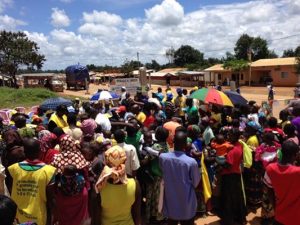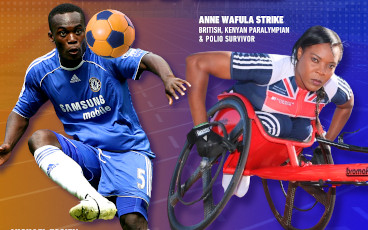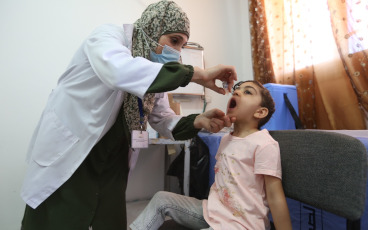Ending the Outbreak in Cameroon: Crucial for a Polio-Free Africa
This World Polio Week, Chris Wolff reflects on progress towards stopping the transmission of polio in Cameroon.

This October marks a year since a wild poliovirus outbreak in Cameroon was confirmed. The Global Polio Eradication Initiative has been working tirelessly to protect children across central Africa to stop the transmission of the virus. In September, the 2nd outbreak response assessment took place in Cameroon to assess just how close we have come towards ending the outbreak, and what challenges we are still facing. Chris Wolff, coordinator of the World Health Organization’s Country Support Team, travelled to Cameroon as part of the assessment team.
In 2014, Cameroon has reported 5 cases of polio. Between February and July, no cases were reported and it looked like the outbreak was closing down. But then in August 2 cases were reported from a refugee camp near the border with the Central African Republic. Those two cases alerted us to the fact that there are still weaknesses in the response. The outbreak cannot be considered over just yet and there is work that needs to be done.
When the outbreak was reported, the initial response was too slow. One of the reasons for this was the fact that most of Cameroon had not been conducting campaigns since 2009 and therefore the whole system was unprepared for doing mass campaigns. Getting everyone re-orientated to changed priorities in a rapid time was a challenge. I think the evolution of the outbreak response since that time has “paid a price” for the time it took to get the first campaigns up and running.
However, when I was in Cameroon recently, I saw signs that the response is now increasingly on track. There has been real progress on a number of fronts. Going to the field, seeing polio activities taking place, participating in the planning and execution of campaigns, I find the most motivating part of the work by far. It is these front line workers who really bring the energy for the job and do the vast majority of the work to eradicate polio.
The outbreak response assessment team congratulated the government of Cameroon for the commitment they have shown since April. The President of Cameroon and the Minister of Health have personally launched campaigns. We concluded that the next step should be to expand this commitment to an all-government approach and to better activate the strong social networks (church groups, mosques, etc.) already in place to mobilize communities for the campaigns.
The response is starting to show improvement in campaign quality and surveillance. However, the improvements are still variable across different geographies of Cameroon; some areas have made real gains but others are lagging behind. We know from years of polio eradication efforts that the virus has an uncanny ability to find these gaps in immunity. There is a need for greater accountability within the system, both for the government and for the implementing partners, so that it is clear who needs to do what to fill these remaining gaps.
One other focus of the assessment was the need to strengthen the involvement of UNHCR and non-governmental organisations in polio surveillance and campaigns in both formal and informal refugee camps. Given the situation in the Central African Republic, health services have collapsed and there is a big immunity gap in the population that are coming in to Cameroon. That gap needs to be closed as rapidly as possible and so we are recommending that campaigns reach children with both the oral polio vaccine and the inactivated polio vaccine, as evidence shows this to be the fastest way to increase immunity.
It is critical. There has been unprecedented progress towards polio eradication in Africa. We have the lowest number of cases across the continent now than ever before and this is driven largely by the gains made by the team in Nigeria, the last remaining polio endemic country on the continent. We have to make sure that outbreak countries in Africa interrupt transmission at the same time that Nigeria does. The outbreak in Cameroon has to be closed down in order to have a polio-free Africa by the end of the year: something I believe is possible.
“I WORK TO ERADICATE POLIO BECAUSE…
… this is a disease which is debilitating and paralysing but could be prevented, firstly by vaccination and ultimately by eradication. We can do this. We must not give up.”
GERALDINE FARRELL-BRAGA, GLOBAL POLIO ERADICATION INITIATIVE












